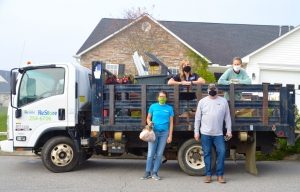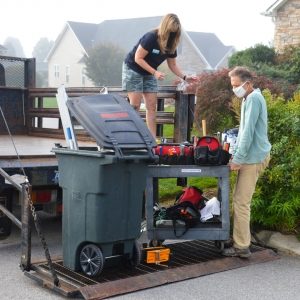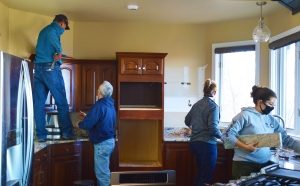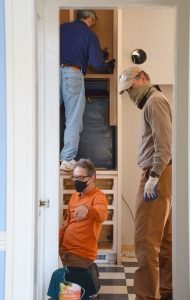Celebrating Earth Day with the Asheville Habitat ReStores
With Earth Day just around the corner, it’s an ideal time to reflect on how the Asheville Habitat ReStores fit into not only our mission and community, but our responsibility to minimize our waste. Our ReStores play a crucial role in recirculating saleable goods within our community at affordable prices. Every item purchased at the ReStore—a gently used piece of furniture, a salvaged building material, or a pre-loved appliance—helps fund Asheville Area Habitat for Humanity’s Homeownership and Home Repair programs. This sustainable cycle not only supports families and individuals in need of safe, affordable housing, but also keeps material objects from the landfill while giving them a second chance at life. Read on to learn more about how we minimize our impact on the environment while maximizing our impact on our community.
Waste Diversion:
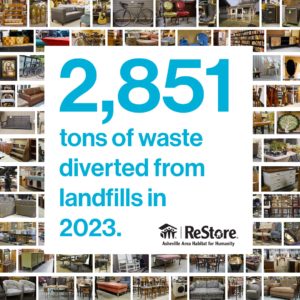
In 2023, the Asheville and Weaverville ReStores diverted 2,851 tons of waste from the landfill. If you’re wondering what that looks like, that’s the mass of roughly 1,400 passenger cars — or more cars than can fit on the Golden Gate Bridge at once! Through a steady stream of cabinets, appliances, furniture, housewares and, yes, even cars, donors in our community kept a veritable San Francisco traffic jam worth of material flowing through the ReStores last year. Gently loved couches that might have been tossed at the transfer station were instead re-homed to people in need of seating on a budget. Volunteers repaired large appliances that had given up the ghost, breathing new life into sturdy old machines with new parts. And excess glassware donated by local restaurants found itself back in style, rather than back in the bin. Though the sheer volume of usable goods kept out of the ground can be hard to conceptualize, the results are not: in 2023, proceeds from the sales of these items helped 16 qualified homebuyers purchase a home in partnership with Asheville Area Habitat for Humanity, and 56 homes in our community saw crucial repairs affordably completed with the help of our Home Repair team.
Fabric Recycling:
 Back in early 2020, the ReStores found themselves in a (mostly positive) pickle: local animal rescue shelters that had been taking accumulated unsaleable fabrics and textiles from the stores could no longer accept them. The shelters, which had been using the fabrics for bedding and cleaning material, were so well supported that they no longer had any need for them. To continue keeping the unsaleable textiles out of the trash, Asheville Habitat connected with Green Zone Recycling. Green Zone, based out of Durham, NC, is the largest textile recycler in the southeast U.S. market, and they have been picking up fabric by the (increasingly large) bag from the Asheville ReStore every week since February of 2020. To date, the ReStores have recycled over 43,815 pounds of fabric through Green Zone, with 14,670 pounds recycled in 2023 alone!
Back in early 2020, the ReStores found themselves in a (mostly positive) pickle: local animal rescue shelters that had been taking accumulated unsaleable fabrics and textiles from the stores could no longer accept them. The shelters, which had been using the fabrics for bedding and cleaning material, were so well supported that they no longer had any need for them. To continue keeping the unsaleable textiles out of the trash, Asheville Habitat connected with Green Zone Recycling. Green Zone, based out of Durham, NC, is the largest textile recycler in the southeast U.S. market, and they have been picking up fabric by the (increasingly large) bag from the Asheville ReStore every week since February of 2020. To date, the ReStores have recycled over 43,815 pounds of fabric through Green Zone, with 14,670 pounds recycled in 2023 alone!
Deconstruction:
 The ReStores don’t just accept donations of cabinets: sometimes we go and pull them ourselves. In 2023, the ReStore’s Deconstruction team completed 82 jobs, extracting reusable building materials prior to remodels or renovations performed by local homeowners, contractors, or businesses. According to a 2018 study conducted by the EPA, “the construction industry contributed more than 600 million tons of waste to landfills, and of that 600 million, 90% was contributed from demolitions.” Our Deconstruction program not only diverts usable material from the landfill, but it also provides an important source of funding for Asheville Habitat by reselling extracted items into the community through the ReStores. Learn more about our Deconstruction program and its economic and environmental benefits in this article by Deconstruction Supervisor Colin Bristow.
The ReStores don’t just accept donations of cabinets: sometimes we go and pull them ourselves. In 2023, the ReStore’s Deconstruction team completed 82 jobs, extracting reusable building materials prior to remodels or renovations performed by local homeowners, contractors, or businesses. According to a 2018 study conducted by the EPA, “the construction industry contributed more than 600 million tons of waste to landfills, and of that 600 million, 90% was contributed from demolitions.” Our Deconstruction program not only diverts usable material from the landfill, but it also provides an important source of funding for Asheville Habitat by reselling extracted items into the community through the ReStores. Learn more about our Deconstruction program and its economic and environmental benefits in this article by Deconstruction Supervisor Colin Bristow.

